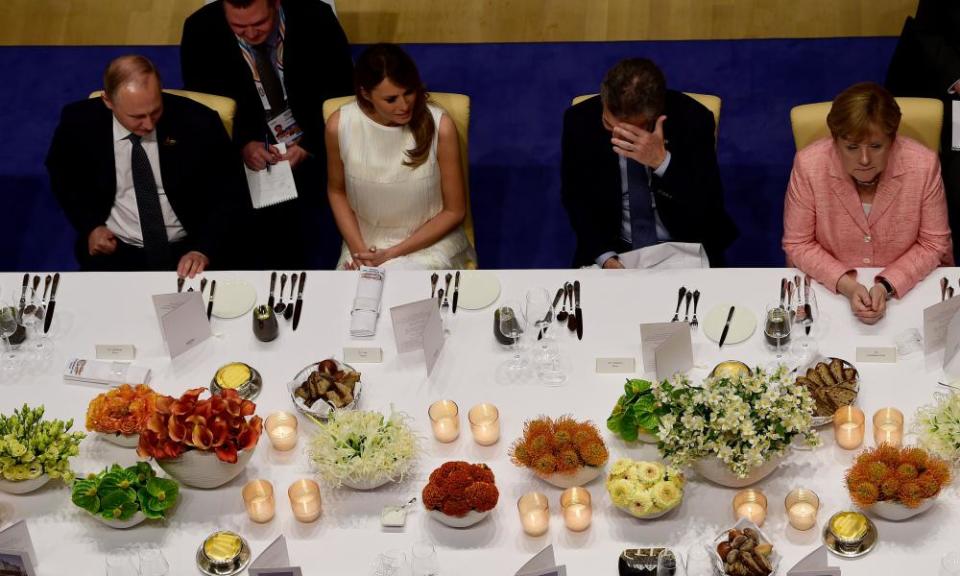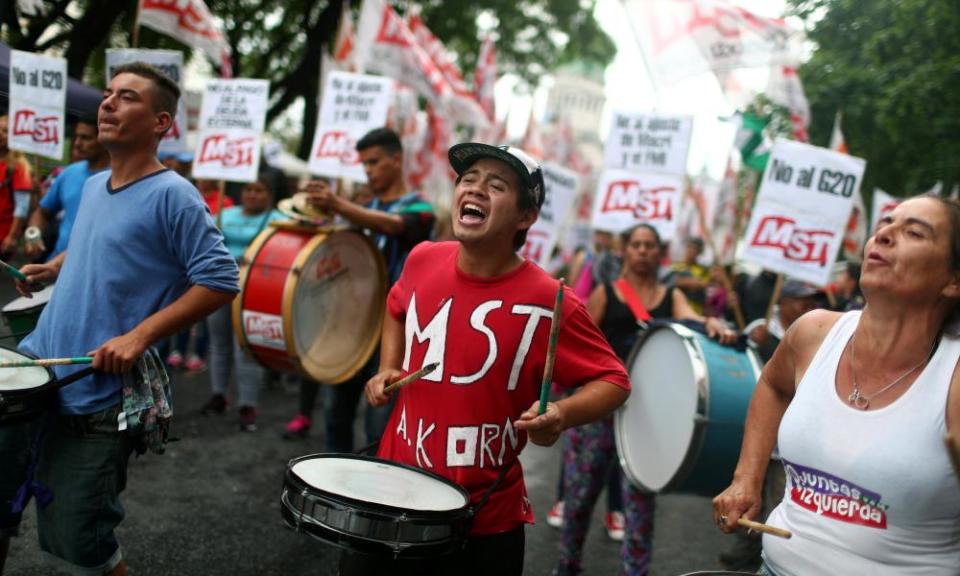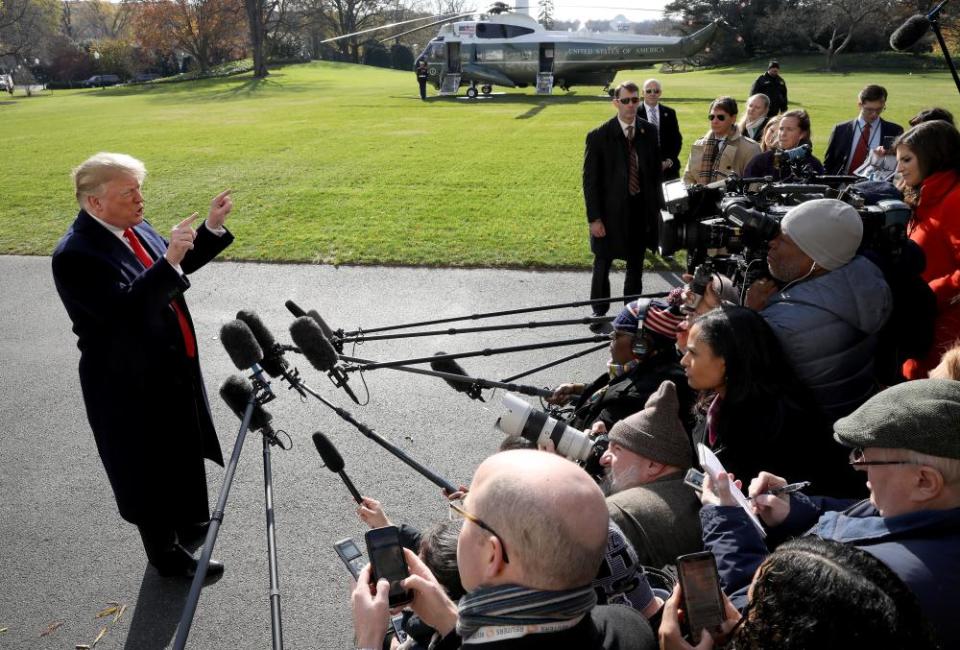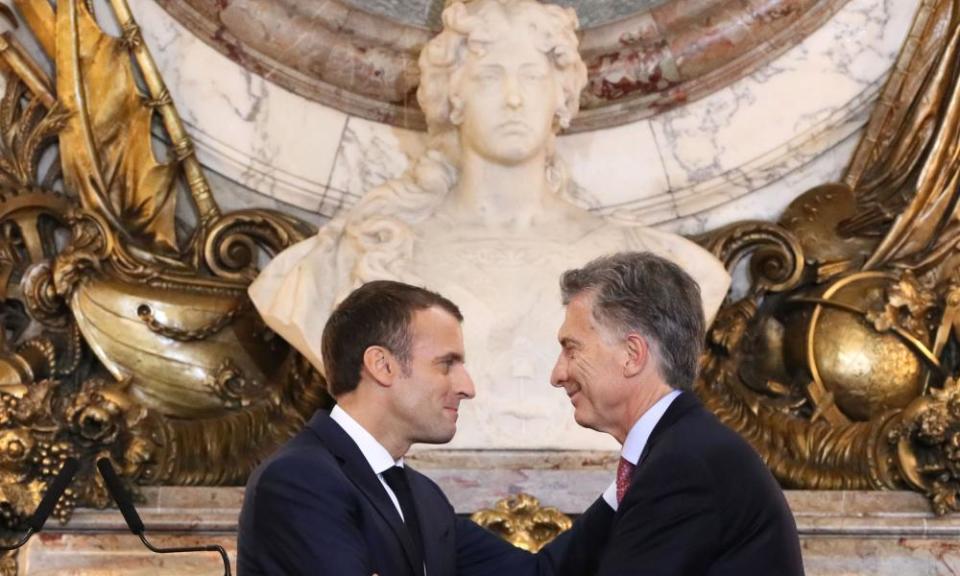G20 summit: can world leaders find unity – or is it simply showboating?
Now in its 10th year, a forum intended to secure global governance has become a stage for increasingly populist leaders

The leaders from the world’s 20 biggest economies converge on Buenos Aires on Friday looking for consensus on the global flows of trade and investment – at a time when such consensus has been increasingly difficult to come by.
Ten years on from the first G20 summit – convened in an effort to alleviate the global financial crisis – the Argentinian hosts are struggling to find common ground among the heads of state and government representing 19 of the biggest national economies and the EU – 85% of global economic output.
A forum intended to be a powerhouse of global governance has become a stage for an increasing number of authoritarian and populist leaders who are there to perform for their restive followers back home. Their power depends on dramatically defying the rule-based order the G20 was created to promote.
They are converging on Buenos Aires like trillion-dollar stake poker players – an oddball bunch, each focused on winning, or being seen to win, at the expense of the others.

Over the two days of the summit, there will be group sessions on financial architecture, sustainable agriculture and the future of work, but this year the big news is likely to be dominated by a set of bilateral duels with unpredictable outcomes.
While the general idea is to talk about money, a lot of the conversations in Buenos Aires will be about blood. First to arrive on Wednesday was Saudi Arabia’s crown prince, Mohammed bin Salman – less than two months after his henchmen killed and the dismembered journalist and regime critic Jamal Khashoggi in the kingdom’s Istanbul consulate.
As the prince set up camp in the Saudi embassy behind a fearsome security cordon in the leafy neighbourhood of Palermo Chico, an Argentinian prosecutor is looking into possible charges of crimes against humanity.
The investigation may not get past his likely immunity as de facto head of state, but it is enough to take the shine off the ostensible goal of the trip to the G20 clubhouse: to show his subjects that he is no pariah, and to challenge the world leaders who buy his oil and sell him weapons to shake his hand in public.
Khashoggi’s murder will hang heavily over the proceedings. Another attendee, Turkey’s president, Recep Tayyip Erdoğan, has so far refused to hush up the murder. He is due to hold a brief “pull-aside” encounter with Donald Trump, Prince Mohammed’s most fervent supporter, and Erdoğan’s office has not ruled out a meeting with the prince himself.
The White House has sent mixed messages. The national security adviser, John Bolton, seemed to rule out a Trump meeting with Prince Mohammed, but Trump has repeatedly said he is willing.
As has been the case for the past two years, Trump’s volatile demeanour will almost certainly provide the focal point. He tends not to prepare for such meetings, preferring to trust his gut feelings in the moment.

On Trump’s appointment diary are meetings with his Argentinian host, Mauricio Macri, Japan’s prime minister, Shinzo Abe, India’s Narendra Modi, the Chinese leader, Xi Jinping, and another “pull-aside” with President Moon Jae-in of South Korea. Angela Merkel will be the one European leader due to have a personal meeting with the US president.
A scheduled session with Putin was cancelled by Trump on his way to the summit, saying his decision had been based on Russia’s failure to return Ukrainian sailors and ships its forces had seized in the Sea of Azov on Sunday. The meeting was to have been any important gauge of the relationship between the two men, at a time when the investigation into his campaign’s links with the Kremlin is edging closer to him personally.
On the day Trump left for Argentina, his former lawyer, Michael Cohen, appeared in court to plead guilty to lying to Congress about his contacts with Russian officials during the presidential campaign, over plans to build a Trump tower in Moscow.
But the Putin meeting had been intended to address unfinished business on arms control from the two leaders’ Helsinki summit in July. Trump may confirm he is leaving the Intermediate Nuclear Forces treaty, to which Russia has promised counter-measures. If the two leaders make no progress on extending the New Start treaty, limiting strategic nuclear weapons, the world will be heading towards the end of arms control within less than three years.
Trump’s meeting with Xi, at a Saturday night working dinner, could be even more significant. The White House has said that if no progress is made in resolving a series of complaints about Chinese trading practices, the systematic state-sponsored theft of intellectual property, for example, Trump will follow through his threat to slap 25% tariffs on Chinese imports, almost certainly triggering a trade war with far-reaching implications for global growth.
Europe will be represented by the UK, France, Germany and Italy as well as the EU leadership. All of the above except Italy will be positioning themselves of the embattled liberal rule-based democratic order, with varying degrees of success.
Theresa May will find it hard to project an aura of stability given the chaos at home, and will be on the alert for pitfalls and snubs that could underline the UK’s declining clout.

With Merkel entering the last act of her leadership and an erratic president in the White House, Emmanuel Macron can be expected to continue his campaign to appropriate the mantle of leader of the western world.
At last year’s G20 in Hamburg, he could be seen jostling his way through the other leaders until he got to the front row of the leaders group photo. It turned out he was just trying to find his way to his assigned place but it looked symbolic nonetheless.
This year’s class photo is likely to be replete with the usual awkwardness – a gauge perhaps of Prince Mohammed’s status as pariah, and another chance to observe Trump’s combat-style grab-and-yank handshake. Even trickier will be the hosts’ task of trying to wangle agreement on a joint statement when it’s all over at Saturday lunchtime.
Trump withdrew his signature from the G7 statement as he flew away from the Quebec summit in June. The Asia Pacific Economic Cooperation summit last weekend failed to agree on a communique for the first time in its 25-year history. Lowest common denominators, once considered bland, are becoming hard to find.

